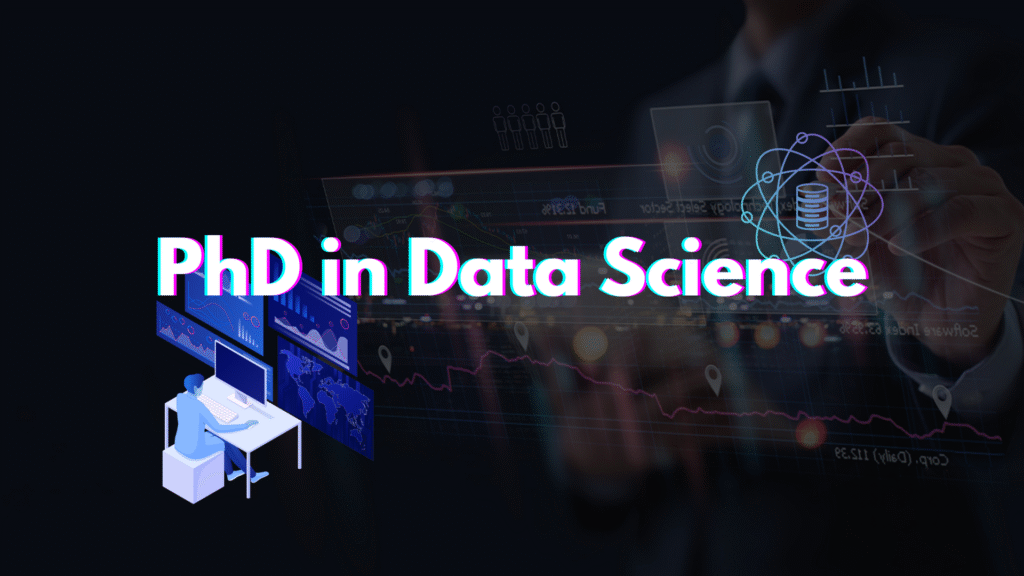In today’s data-driven world, a Master’s in Data Science can open many doors. But for those who want to not just walk through those doors but design the building itself, a PhD in Data Science is the ultimate key. This path is a significant investment of time and intellect, but the returns both professional and personal are profound.

At BS Eduworld, we understand the aspirations of future innovators. Here are the five transformative benefits of earning a PhD in Data Science that can elevate your career to an elite level.
1. Transition from Practitioner to Pioneer
A Master’s degree teaches you to apply existing models and tools. A PhD in Data Science trains you to create them. You move from using libraries like TensorFlow and Scikit-learn to developing novel algorithms, designing new neural network architectures, and pushing the boundaries of what’s possible in artificial intelligence and machine learning. This role shift from a user to an innovator is the core differentiator of a doctorate.
2. Develop Deep, Theoretical Mastery
While a Master’s provides breadth, a PhD offers unparalleled depth. You will build a rock-solid foundation in the advanced mathematics that underpin data science:
- The calculus of optimization and gradient descent
- The l inear algebra behind high-dimensional data transformations
- The statistics of inference and generalization
- The computational theory of algorithms
This deep theoretical knowledge allows you to diagnose complex model failures, anticipate limitations, and develop principled, cutting-edge solutions instead of relying on trial and error.
3. Unlock Elite and Leadership Career Tracks
The credential of a PhD in Data Science opens doors to the most prestigious and well-compensated roles in the industry, many of which are exclusive to doctorate holders.
- Lead Data Scientist: Architect the data strategy for Fortune 500 companies.
- Research Scientist: Drive innovation at top AI research labs like Google DeepMind, OpenAI, or Microsoft Research.
- Chief Data Officer (CDO): Lead data-driven transformation at an organizational level.
- Academia: Become a professor and shape the next generation of data scientists while conducting grant-funded research.
4. Gain a Powerful Competitive Advantage
The demand for data scientists is high, but the supply of experts with deep theoretical knowledge and research experience is low. A PhD sets you apart in a crowded market. It signals to employers that you possess not just technical skills, but also the resilience, intellectual curiosity, and problem-solving prowess required to tackle the world’s most complex data challenges. This unique positioning often translates to higher starting salaries and faster career advancement.
5. Solve High-Impact, Real-World Problems
A PhD empowers you to work on projects that have a tangible, positive impact on society. Your research could lead to breakthroughs in:
- Healthcare: Developing AI models for early disease detection.
- Climate Science: Analyzing environmental data to combat climate change.
- Finance: Creating robust models for risk assessment and fraud detection.
- Public Policy: Using data to inform and improve government services.
You gain the expertise to not just analyze data, but to use it to solve meaningful global challenges.
- Explore accredited PhD in Data Science
- Schedule a free meeting with our experts.
Is a PhD in Data Science Right for You?
Pursuing a PhD in Data Science requires a strong passion for research, a high tolerance for ambiguity, and the perseverance to spend years delving deep into a specific problem. It is a journey of intense intellectual challenge.
However, if you are driven by a desire to innovate, lead, and leave your mark on the field of data science, the investment is unparalleled. It is the path for those who want to be at the forefront of the AI revolution.
Ready to begin your journey? BS Eduworld is here to guide you every step of the way, from choosing the right program to preparing a strong application.
FAQ: PhD in Data Science
Q1: What is the difference between a PhD in Data Science and a PhD in Computer Science?
A: A PhD in Computer Science is broader, covering everything from systems and networks to theory. A PhD in Data Science is deeply focused on the statistics, machine learning, and computational methods required to extract knowledge and insights from data. It is more interdisciplinary, often blending CS, statistics, and domain expertise.
Q2: How long does it take to complete a PhD in Data Science?
A: Typically, a full-time PhD in Data Science takes between 4 to 6 years to complete. This includes 2-3 years of advanced coursework and qualifying exams, followed by 2-3 years of dedicated research and dissertation writing.
Q3: Can I pursue a PhD in Data Science without a Master’s degree?
A: Yes, many programs accept highly qualified students with a strong Bachelor’s degree directly into their PhD programs. These students often earn a Master’s degree along the way as part of their PhD coursework.
Q4: What are the prerequisites for applying to a PhD program?
A: Strong prerequisites include a background in mathematics (calculus, linear algebra, statistics), proficiency in programming (Python, R, SQL), and often, prior research experience. A degree in a quantitative field like computer science, math, engineering, or physics is highly beneficial.
Q5: How is a PhD program typically funded?
A: Most reputable PhD programs offer full funding through research assistantships (RAs) or teaching assistantships (TAs). This funding usually includes a full tuition waiver and a monthly stipend to cover living expenses, allowing you to focus entirely on your studies and research.
